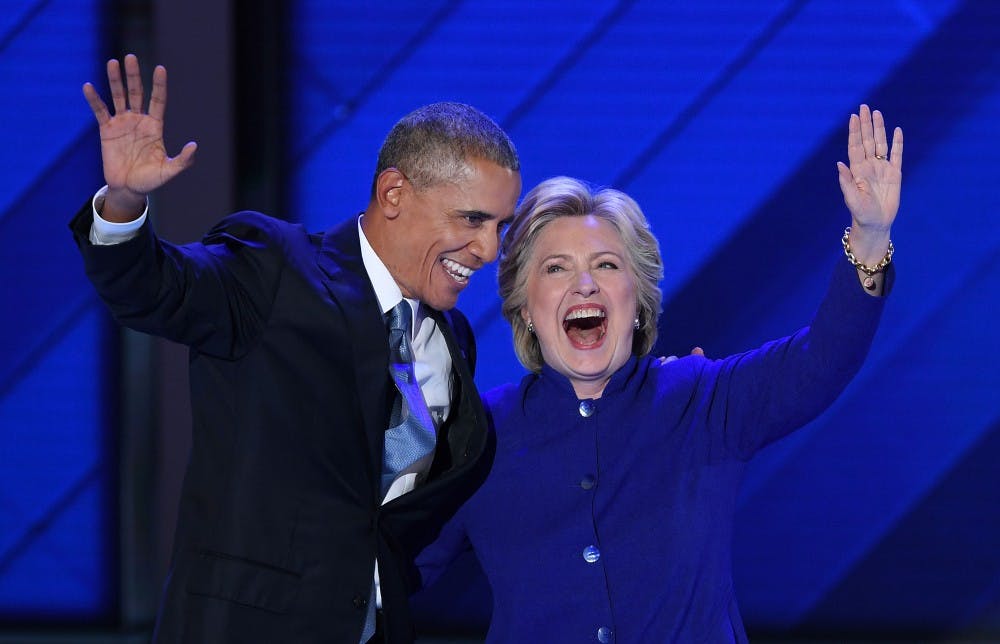The Democratic National Convention came hot on the heels of its Republican counterpart — and did so with the same amount of spectacle and aplomb.
Democratic leaders at the Wells Fargo Center in Philadelphia, Pennsylvania selected Hillary Clinton to be the first female presidential nominee of a major political party, Bernie Sanders' shot for the White House finally came to an end and Bill Clinton came back into the national limelight yet again.
The convention had no shortage of big moments, but there were five that stood out throughout the course of the week.
5. The party attempted a show of solidarity
The entire presidential race has been one of contention for the Democratic Party. As soon as it became clear that Sanders was a force to be reckoned with, the party caved in on itself.
Although Sanders ran in opposition to Clinton for the majority of the campaign, he finally laid down his arms and asked delegates to nominate Clinton Tuesday night. Sanders even explicitly called for the nomination to be given to Clinton.
Although the party itself began to unify, Sanders supporters staged a walkout following Clinton's nomination.
Bernie Sanders supporters stage #DemConvention walkout after Clinton clinches nomination. https://t.co/4Ej3YlNMFK https://t.co/ONGZLB7LXR
— ABC News (@ABC) July 27, 2016
Clinton attempted an embrace of the spurned Sanders supporters by displaying empathy toward their cause.
"To all of your supporters here and around the country: I want you to know, I've heard you," she said at the convention. "Your cause is our cause. Our country needs your ideas, energy and passion."
Both parties have to deal with a vast amount of frustrated voters within their own respective camps — something they'll have to overcome if either nominee wants a shot at 1600 Pennsylvania Ave.
4. Bill Clinton reminded us he's not going anywhere
Ever since he became president, Bill Clinton hasn't been able to keep himself out of the national spotlight — and the country will be in for four more years of that if Hillary gains the presidency.
Watch Bill Clinton's humanizing #DemsInPhilly speech about the "real" Hillary https://t.co/Yvn5FzZZOShttps://t.co/OaVkNixwfV
— Rolling Stone (@RollingStone) July 27, 2016
Bill Clinton took the stage on the second night of the convention to speak at length about his wife, and why he believes her to be the best choice for president in this election.
"Hillary is uniquely qualified to seize the opportunities and reduce the risks we take," he said at the convention Tuesday night. "And she is still the best darn change-maker I have ever known."
Although the country has grown accustomed to the former president's flamboyance, he displayed a much more mellow facet of his personality at the convention.
3. The Democratic party is as far left as the GOP is far right
Perhaps the reason Sanders — essentially a socialist — was able to put up such a fight this election is because of the sharp contrast between the country's two main parties.
What has historically worked as a fairly easy way to elect a president who can satisfy the needs of both parties has turned into a race between two extreme ends of the political spectrum.
While the Republican National Convention had a great deal of fanfare with Donald Trump's WWE-esque entrance and chants about Hillary Clinton to "Lock her up," the DNC struck a similar chord — although it was at the opposite extreme.
Conventions are intended to be neutral toward the candidates in their respective parties, which is an image the Democratic party now has to work to uphold following a WikiLeaks release of emails and voicemails which allege the DNC was working toward securing the nomination for Clinton.
The scandal has caused the Democratic party to restructure its top leaders. Debbie Wasserman Schultz, the Democratic National Committee chair, announced on Sunday that she would resign at the end of the convention.
Wasserman Schultz pointed to the email scandal as the reason she was stepping down from her post.
2. Policy reform was a talking point — but not the top item on the agenda
Sanders announced at the convention that he had teamed up with Clinton to bring a tuition-free college plan to the national arena.
Although this policy was discussed, much of the convention's platform was platitudinous — much like the conversation at the RNC.
Much of the conversation at the DNC revolved around the notion that America never ceased to be great — as Trump contends — and a notion that unity will ensure the country stays that great.
Policy did not make its presence fully known until Tim Kaine, Clinton's pick for vice president, and Clinton herself spoke — both of whom have years of experience in public service.
While leaders at the convention lauded unity and diversity, the conversation did not go deep beyond the surface — something both parties will need to work on before the Trump-Clinton debates start up.
1. It was a convention rife with history
Clinton's nomination marks the first time a woman has headlined a major political party's ticket — but that was not the only historically significant event to unfold at the convention.
Arizona's 102-year-old delegate, older than women's right to vote, cast votes for @HillaryClinton #DemsInPhilly pic.twitter.com/ied8Pimego
— Mashable News (@MashableNews) July 26, 2016
Jerry Emmett, Arizona's 102-year-old delegate, cast the state's delegation for Clinton. Emmett grew up in a time before women had the right to vote, making her moment at roll call all the more significant.
"I'm 102," she told the Clinton campaign's Instagram. "My whole life, I keep asking God, let me have one more chance — if you let me go to the convention, I'll go home to heaven without making a little fuss."
Reach the reporter at jwbowlin@asu.edu or follow @mrjoshuabowling on Twitter.
Like The State Press on Facebook and follow @statepress on Twitter.




